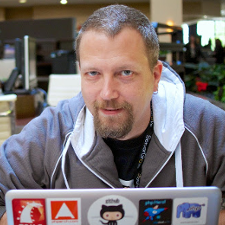
In my almost twenty years as a professional programmer I’ve tried to guide my career using two phrases: “we’re not losers, we’re choosers” and “luck is the intersection of skill and opportunity.” Armed with this mindset I’ve been able to turn what started out as a job building a web site for a small company that sold CD’s to professional DJ’s into a very rewarding career that have given me some memorable experiences.
In this talk I’m going to share my journey with you and highlight the role that getting involved in open source software and community organization let me go from programming as a job to programming as a career. I’ll talk about my approach to skill building, job selection, and how being able to take advantage of what life presented me allowed me to be Grumpy and happy.
Although MongoDB is a non-relational database, it is still very important that you store your data in an optimal way. This presentation make you grow up from just starting with MongoDB, to a seasoned user, by teaching you how to design your data schema according to your application's needs. This requires a different mind set than designing for a relational database.
Besides schema design techniques, I will also cover how to pick indexes, different types of indexes, and way to find out why queries are potentially not as fast as they could be.
As a refinement to his previously published book, the author of "Building APIs You Won't Hate" found that API books and training tend to introduce documentation, testing and caching as an after-thought, as if these are not important. However, some new experiences have shown that API development works best when these items are thought out first, as well as including a strong pragmatic approach to ensure the API solves real problems without getting stuck on the theory of how to "properly" create it.
Other pragmatic talking points include: Why and how documentation first can stop your team(s) from getting violent, when is REST not what you want, why is hypermedia sometimes a distraction, convenient ways to avoid versions in your API or at least postpone it, and comprehensive but simple endpoint integration testing beyond trivial examples.
You've got your tests, your metrics, your database migrations and your system provisioning automated, but how can you deploy everything with a push of a button and not be scared something goes wrong? Welcome to the continuous PHP Pipeline.
In this talk I take the code, the tests, the metrics and the provisioners and show you how you can have a continuous delivery pipeline setup based on certain criteria you define upfront, your code gets automatically deployed to staging or to production with all the arbitrary tasks along with it.
Never get stressed again about deployments. Make deployments as easy as committing to your repository and get home on time to enjoy your well deserved weekend.
Over the last decade the idea that we should test our applications has slowly made its way from a niche idea to the mainstream of PHP development. With many tools and approaches to testing now available it can be difficult to choose which ones to use.
In this talk we will explore the current landscape of PHP testing practices, look at the different tools and approaches available, and find out how we can decide which are best for our project, team, and context.









